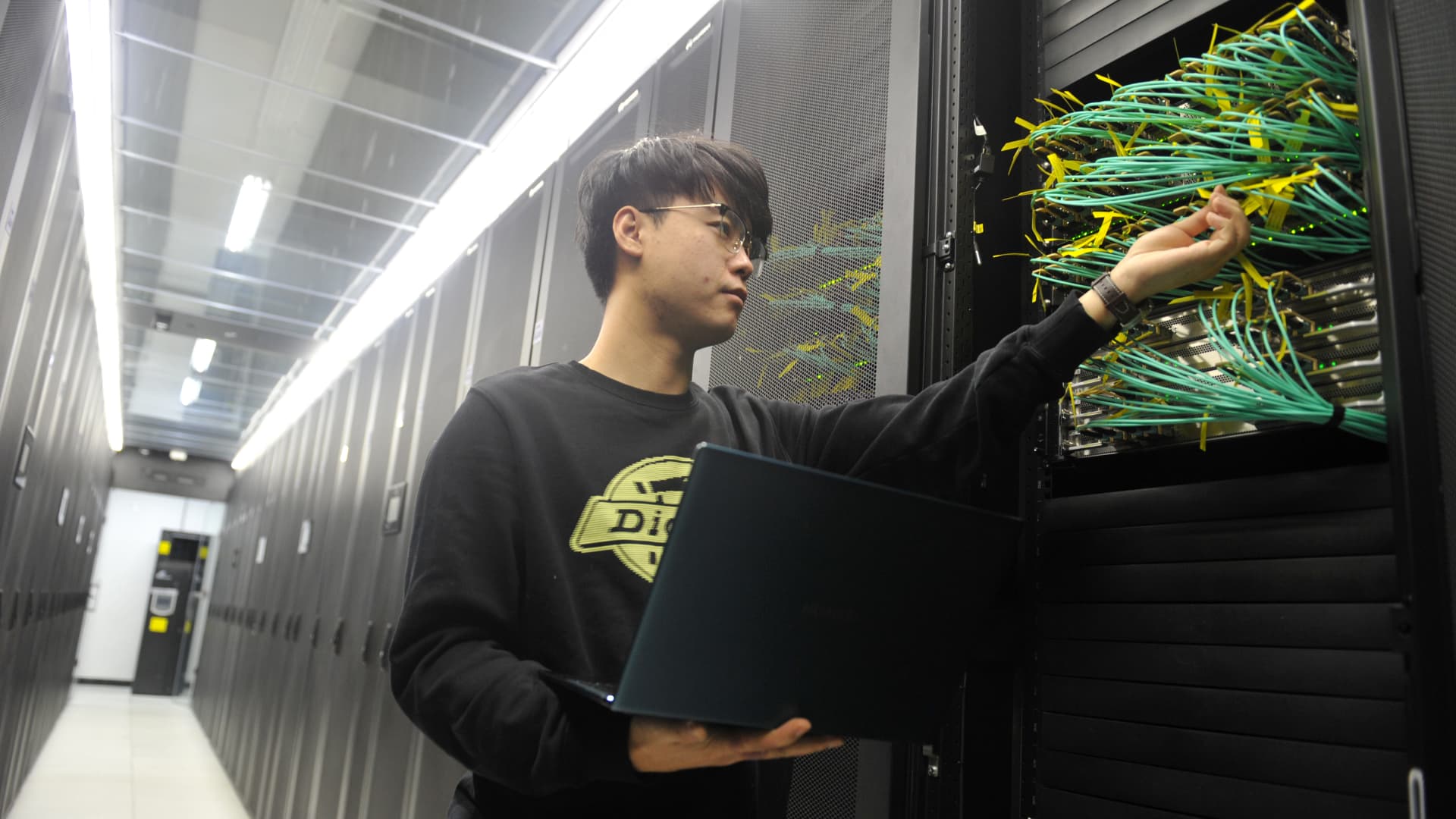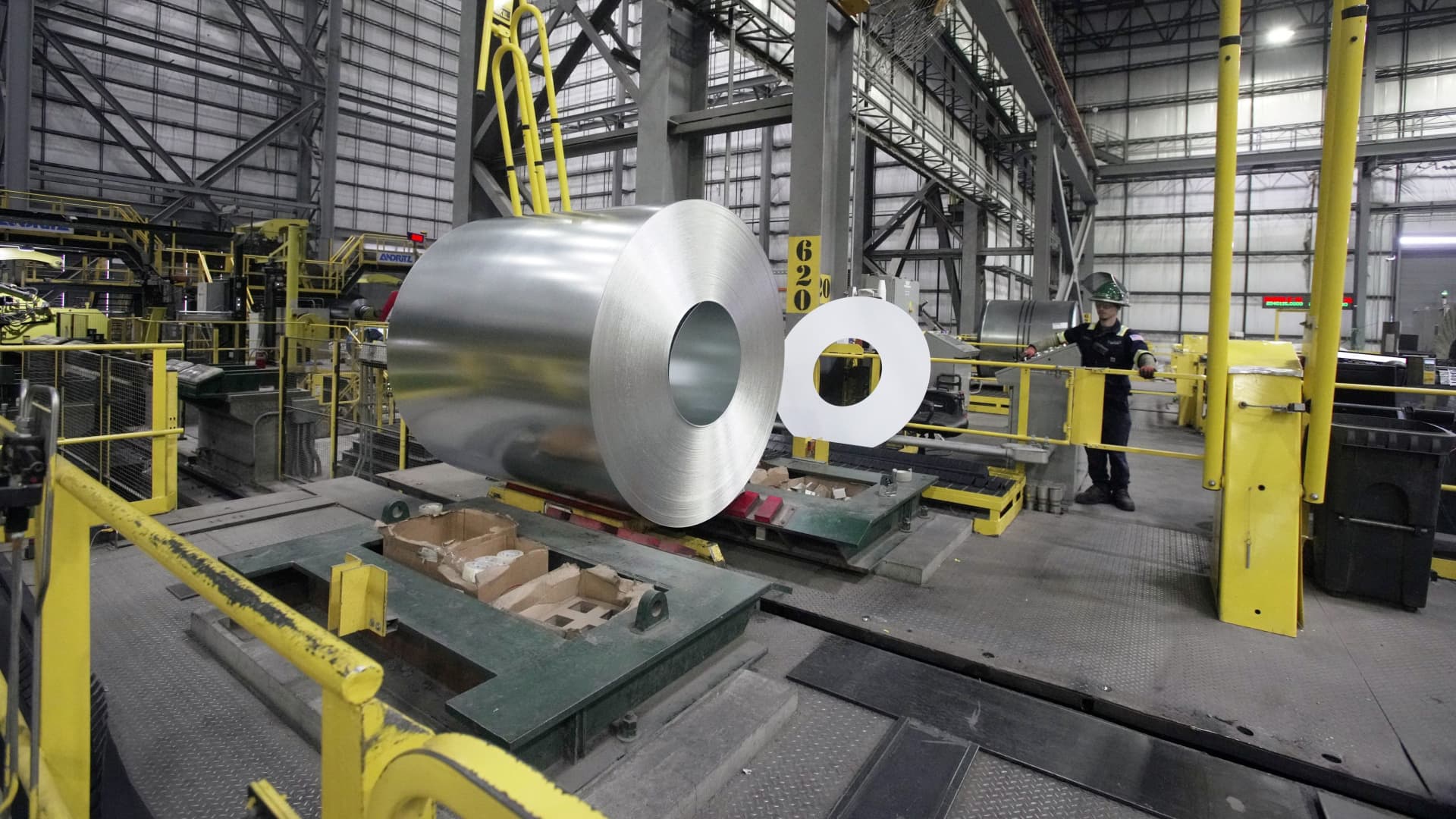While U.S.-China trade tensions escalate , analysts predict a handful of Chinese companies could win out on Beijing’s efforts to double down on generative artificial intelligence. “We expect AI demand to stay strong as deepseek cost improvements have driven application development such that companies are seeing AI development as critical for growth and for competition,” Bernstein analyst Boris Van and a team said in an April 7 note. “We also expect the development for the AI+chip ecosystem to be a key push from the government to offset tariff impacts,” the analysts said. Chinese companies have rushed to try out DeepSeek’s generative artificial intelligence capabilities in the last few months. Some businesses have reported cost savings , and strategists expect that could help corporate earnings finally turn around. Bernstein’s two outperform-rated plays are Shanghai-listed Kingsoft Office, operator of word-processing app WPS, and Hong Kong-listed Kingdee , which sells software services for business management. The investment analysts pointed out that during the escalation in U.S.-China tensions during U.S. President Donald Trump’s first term, Chinese spending on local information technology increased as localization policies were announced, partly to offset tariff impacts on trade. “We could likely see a scenario where AI is the new critical technology that China will use to sustain further growth,” the Bernstein analysts said, noting that locally created systems such as the Huawei ecosystem could be promoted. The AI-integrated version of WPS reached 19.68 million monthly active users in mainland China last year, Kingsoft Office said in an annual report last month. The company has released a version of WPS for Huawei’s HarmonyOS Next operating system that claims to be independent of Android. Kingdee said in its annual report last month that it planned “a full pivot into an Enterprise Management AI company” this year. The company said in a filing last week that it gained new customers in the first quarter, including automaker Geely, spirits company Kweichow Moutai and 01.AI, an AI start-up founded by former Google China head Kai-Fu Lee. The Economist Intelligence Unit estimates China’s AI-related spending will grow by up to 25% annually this year and next, adding up to 0.13% of 2024’s nominal gross domestic product in economic output. Tariff tensions between the U.S. and China However, Goldman Sachs and Citi in the last week cut their forecasts for China’s economic growth this year given heightened tensions between the U.S. and Beijing. China on Friday hit back at yet another round of U.S. tariff increases with duties of its own . Both nations escalated their duties on one another’s goods to triple-digit rates . China said it planned to “ignore” subsequent U.S. tariff increases, but remained committed to retaliating if necessary on other U.S. actions. “The full-swing tariff war may hurt the macro economy and the ripple-effect may spread over to most of the economic sectors,” Nomura’s China technology research analyst Bing Duan and a team said in an April 7 note. “Meanwhile, we think domestic AI demand would remain buoyant, following DeepSeek’s innovation and China’s ambition for AI leadership.” “We like [internet data center]/Cloud companies the most as the demand is largely unaffected by the ‘reciprocal’ tariff,” Nomura said. Their buy-rated plays in the category include state-owned China Mobile and two U.S.-listed stocks: GDS and Vnet . Shanghai-based GDS, which develops and operates data centers in China, forecast revenue this year would rise by at least 9.4% to 11.29 billion yuan. Beijing-based Vnet said its net revenues from internet data center increased by 28.3% last year to 1.63 billion yuan. “The overall utilization rate of wholesale data center in Greater Beijing Area is projected to reach 85% as early as 2025, marking the first potential supply shortage in the market,” the company said in an earnings call, according to a FactSet transcript. Less than 5% of each of the companies’ revenue comes from the U.S., while the remainder primarily comes from China, the analysts said. “We think the key growth drivers for China’s cloud computing and IDC companies are the pent-up demand for computing power / infrastructure after DeepSeek was launched, which is not directly affected by the tariff hike,” the Nomura analysts said. “To mitigate the tariff impact on China’s export growth, the government may continue to encourage the investments to boost domestic growth, especially in digital infrastructure, including cloud computing & IDC infrastructure. Nomura’s second-most favored category is AI software and applications, where the analysts’ buy-rated plays are Hong Kong-listed Kingdee and Kingsoft Corp , parent of Kingsoft Office. — CNBC’s Michael Bloom contributed to this report.

 Personal Finance1 week ago
Personal Finance1 week ago
 Blog Post1 week ago
Blog Post1 week ago
 Economics6 days ago
Economics6 days ago
 Economics1 week ago
Economics1 week ago
 Accounting6 days ago
Accounting6 days ago
 Personal Finance1 week ago
Personal Finance1 week ago
 Economics7 days ago
Economics7 days ago
 Personal Finance6 days ago
Personal Finance6 days ago









